| Srl | Item |
| 1 |
ID:
097819
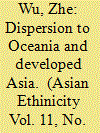

|
|
|
|
|
| Publication |
2010.
|
| Summary/Abstract |
Since most of South Asian Tibetan refugees have not secured formal immigration status in their host countries, their dispersion has expanded to other continents. Compared to those Tibetans living in South Asia, Europe and North America, Tibetans in Australia and New Zealand emigrated there on their own, married citizens, or went to study, work, or engage in religious or cultural activities. Tibetan diasporization in Oceania has proven successful. There are only around 60 Tibetans residing in Japan, some of them hold a Taiwanese (Republic of China) passport, which makes it easier to obtain a Japanese visa, and others are fulltime staff members of the liaison office of the Dalai Lama in Japan. Under Seoul's stringent immigration laws, less than 20 Tibetans reside in South Korea, mostly on work visas. Tibetan exiles and their supporters often protest to the Visiting Chinese Leaders or Embassy of China in Oceania and developed Asian countries.
|
|
|
|
|
|
|
|
|
|
|
|
|
|
|
|
| 2 |
ID:
121938
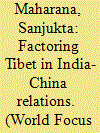

|
|
|
|
|
| Publication |
2013.
|
| Summary/Abstract |
In the borderless world, demarcating boundaries between and among the countries or the border issue is an important problem from historical period. The countries have been engaging in the border conflict, the solution of which would not be found in one day conversations. On the one hand Tibet issue is related to India-China ongoing border problem and on the other hand India supports the Tibetans on humanitarian ground for the preservation of their culture and religion and provides Dalai Lama and Tibetan refugees to establish government in exile in India.
|
|
|
|
|
|
|
|
|
|
|
|
|
|
|
|
| 3 |
ID:
183720
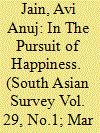

|
|
|
|
|
| Summary/Abstract |
Refugees often experience adverse circumstances as a consequence of displacement from their homes due to conflict, directly affecting their happiness and well-being. This study focuses on Tibetan refugees because of their relatively successful transition into other parts of the world, their effective advocacy to improve their plight and the gradual reduction of repression on the part of China’s government against them. The literature reveals that happiness among refugees is usually a consequence of the interplay of various factors in their destination country. This study seeks to verify the exact nature of these claims by considering the influence life satisfaction, life orientation and the environment has on the happiness of young Tibetan refugees in India. The study concludes with recommendations for stakeholders, including relief organizations, psychologists and counsellors.
|
|
|
|
|
|
|
|
|
|
|
|
|
|
|
|
| 4 |
ID:
143549
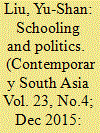

|
|
|
|
|
| Summary/Abstract |
This article presents a study of the textbooks composed and released by the Tibetan Government-in-Exile for the Central School for Tibetans in India. By examining the textbooks on Social Studies and history, it looks at how the Tibetan Government-in-Exile engages with various external and internal ‘others’ in the process of constructing knowledge of the Tibetan nation, and at how it represents Tibetan life to those who were born in exile. It is contended that schooling and power are interrelated, and textbook curricula represent a way in which national power dominates the selection and representation of public knowledge. The article concludes by suggesting that the limits applied by their refugee status to the Tibetans in India has sometimes turned into the energy/force of empowerment, which not only permits flexibility in the shaping of a national identity but creates spaces for negotiating the multiple boundaries.
|
|
|
|
|
|
|
|
|
|
|
|
|
|
|
|
| 5 |
ID:
113697
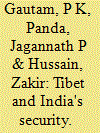

|
|
|
|
|
| Publication |
New Delhi, IDSA, 2012.
|
| Description |
214p.
|
| Standard Number |
8186019995
|
|
|
|
|
|
|
|
|
|
|
|
Copies: C:2/I:0,R:0,Q:0
Circulation
| Accession# | Call# | Current Location | Status | Policy | Location |
| 056671 | 327.540515/GAU 056671 | Main | On Shelf | General | |
| 056672 | 327.540515/GAU 056672 | Main | On Shelf | General | |
|
|
|
|
| 6 |
ID:
131180
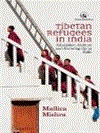

|
|
|
|
|
| Publication |
New Delhi, Orient Blackswan Private Limited, 2014.
|
| Description |
xxi, 304p.Hbk
|
| Standard Number |
9788125054979
|
|
|
|
|
|
|
|
|
|
|
|
Copies: C:1/I:0,R:0,Q:0
Circulation
| Accession# | Call# | Current Location | Status | Policy | Location |
| 057759 | 325.21095150954/MIS 057759 | Main | On Shelf | General | |
|
|
|
|
| 7 |
ID:
117165
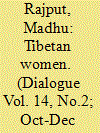

|
|
|